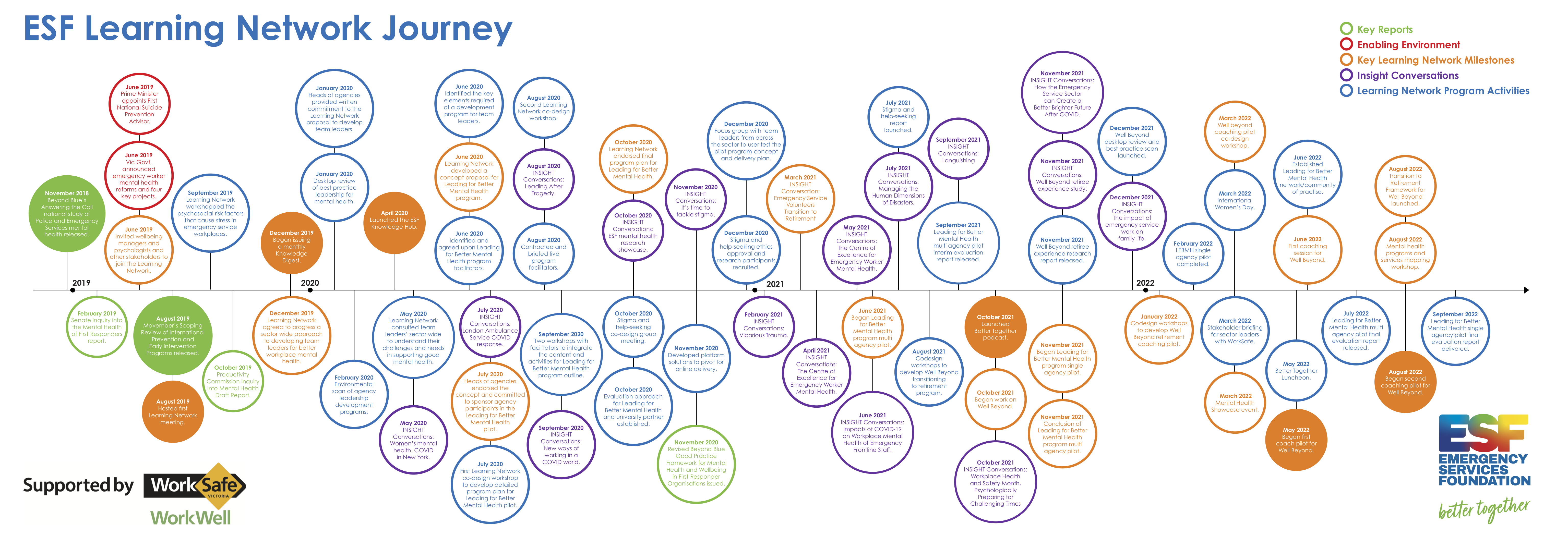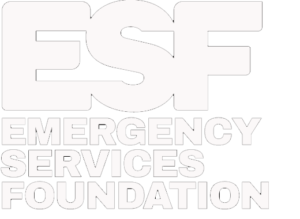The Emergency Services Foundation (ESF) received WorkSafe WorkWell funding from Jan 2020-August 2022 to Chair a Learning Network for the Emergency Management Sector in Victoria.
Though funding has ceased, the ESF Learning Network continues to connect wellbeing managers from 14 Victorian emergency management agencies and subject matter experts in monthly meetings and other activities to share ideas and knowledge to support evidence-based and consistent mental health and wellbeing outcomes across the sector.
With WorkSafe WorkWell funding, members of the ESF Learning Network collaboratively designed and developed two innovative workplace programs: Leading for Better Mental Health and Well Beyond.
The underlying principle of the ESF Learning Network is that a collaborative approach will help emergency management agencies be stronger, and more consistent and creative in their response to the mental health needs of their volunteers and staff
Approach
The ESF Learning Network uses an integrated approach to tackle the work-related factors for mental health. Its purpose is for Victorian emergency management organisations to:
- Share experiences, insights, and resources to build a shared understanding and to cross-fertilise ideas about issues and solutions to promote workplace mental health and wellbeing in the emergency services sector.
- Co-design a leadership pilot to develop frontline managers to lead for better mental health and wellbeing.
- Build personal and sector-wide capacity and consistency through knowledge sharing and translation activities.
Siusan MacKenzie (CEO of ESF) is the Chair of the ESF Learning Network, and Martine Gilliot is the project manager.

Bringing Organisations Together
The ESF Learning Network brings together Subject Matter Experts (SMEs) and the following organisations:
- Country Fire Authority (CFA)
- Fire Rescue Victoria (FRV)
- Emergency Services Telecommunications Authority (ESTA)
- Red Cross
- Ambulance Victoria (AV)
- Life Saving Victoria (LSV)
- Victoria State Emergency Service (VicSES)
- Victoria Police (VicPol)
- The Victorian Council of Churches Emergencies Ministry (VCCEM)
- St John Ambulance
- Department of Environment, Water, Land and Planning (DEWLP), Forest Fire Management (FFM)
- Bushfire Recovery Victoria (BRV)
- Emergency Management Victoria (EMV)
- The Inspector General of Emergency Management (IGEM)
Improve Mental Health and Wellbeing
125,000 staff and volunteers make up the Victorian Emergency Services workforce. It is a high-risk industry with predictable exposure to potentially traumatic events and inherent stressors due to the job demands. Every day in Victoria, emergency management agencies respond to 7000 calls made to 000.
A 2018 Beyond Blue study of police and emergency service people nationwide revealed just how much the job impacts the wellbeing of people in the sector. It showed these frontline workers have critical mental health needs with more than twice the rate of psychological distress, mental health conditions and suicidal thoughts than the general population.
This major study revealed “a workforce that is deeply impacted, both by the nature of the work they do and the pressures of the environments in which they work”. That is, poor workplace practices and culture are as damaging to mental health as exposure to violent and traumatic incidents.
“A supportive work culture is like giving everyone in the organisation a mental health inoculation”.
Victoria’s emergency management organisations are all working hard to build mentally health workplaces. They recognise that:
- All organisations across the sector are dealing with similar mental health challenges
- Working collaboratively on shared challenges will have a greater impact sector wide
Supported by WorkSafe WorkWell, Learning Network responds to this call by supporting collaborative efforts to leverage shared experience and the evidence to promote emergency management workplaces to be psychologically safe for staff and volunteers.
Integrated approach
ESF will use the ‘integrated model’ in their approach to improving mental health outcomes for frontline workers. Developed by Anthony LaMontagne (2014) and colleagues this model promotes a holistic, preventative, and strength-based approach to workplace mental health.
The integrated model encompasses three areas of activity that:
- protects mental health by reducing work-related and other risk factors for mental health problems;
- promotes mental health by developing the positive aspects of work as well as worker strengths and positive capacities;
- responds to mental health problems as they manifest at work regardless of cause (work-related or otherwise).
This model distils complex requirements, for a complex need, so that workplaces can begin from varying starting points and develop, over time, mature multi-component workplace mental health programs.
Knowledge Sharing and Translation
The ESF Learning Network shares and translates knowledge through:
- Learning Network Meetings
- Mental Health and Wellbeing Showcase Event
- Knowledge Digest – a monthly digest that summarises information and research to build the evidence-base for improving mental health and wellbeing in Victoria’s emergency services.
- Knowledge Hub – provides information about programs, products, practices, and policies that currently exist to improve mental health and wellbeing in the emergency service sector.

ESF acknowledges the support of the Victoria State Government in the development of the Learning Network.

